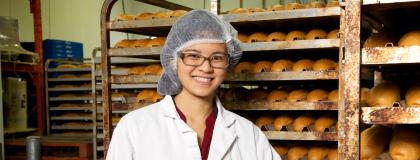
Food Science Co-op Student Information
About The Program
Food Science is an applied discipline that draws on all areas of science: chemistry, physics, engineering, biology and nutrition. Food scientists are involved in the transformation of raw agricultural products into various consumer products. A tremendous amount of technical training is required to develop and formulate safe, nutritious foods, manufacture and package them, preserve their quality and supply the consumer with a wide variety of menu items and snack foods. In our new state-of-the-art facilities, you will gain these technical competencies and will apply this knowledge to industrial processes.
Why Co-op?
As a co-op student, you will gain relevant work experience, build professional networks, and develop essential interpersonal skills needed to succeed in the workplace, all while getting paid and earning your university degree. Guelph’s co-op program is unique due to the exceptional level of support provided throughout the co-op experience. Students will complete a comprehensive course preparing them for the co-op employment process, and will receive guidance from a knowledgeable team of staff dedicated to their development and success.
Course Sequencing
| YEAR | FALL | WINTER | SUMMER |
|---|---|---|---|
| ONE | Academic | Academic | Off |
| TWO | Academic | Academic | Work |
| THREE | Academic | Academic | Work |
| FOUR | Work | Work | Off |
| FIVE | Academic | Academic |
Acquired Knowledge & Skills
Knowledge
Well-developed computer literacy and problem-solving experience.
Application
Strong analytical skills developed through completing extensive research projects.
Collaboration
Experience working independently and on a team when completing assignments.
Communication
Excellent ability to communicate developed through oral presentations and report writing.
Sample Jobs
There is a diverse selection of jobs made available to Food Science Co-op students, in government, academia, and the private sector. Students may conduct research, participate in literature searches, assist in data collection and analysis, and/or may formulate, prepare, and analyze food samples. Students may work in a laboratory, on a production or manufacturing floor, or in an office setting. Below are some examples of positions that may be held by Food Science Co-op students:
Quality Assurance Co-op Student
Students will be responsible for recommending and implementing changes within the production process to improve internal controls and departmental efficiencies, work with Quality Manager & Quality Systems Supervisor to develop methods, SOPs, WI, for the Plant operations & cleaning practices, and provide compliance reports.
Sensory Assistant
In this role, you will prepare all samples and products for various sensory tests, complete data entry including basic statistical analysis of tests performed. Students will complete sample preparation, set-up / clean-up for daily evaluation of raw materials, water and process samples. As well, assist with new product development.
Research & Development Intern
In this role, students will assist R&D Manager in product development, develop specifications for all new and enhanced ingredients, products and packaging, conduct plant trials and first productions and subsequent formal product evaluations. Student will also develop specifications for all new and enhanced ingredients, products and packaging.
Additional Sample Jobs: Food Microbiology Student, Government Policy Analyst, Product Developer, Sensory Evaluator, Technical Support, and more.
Sample Employers*
- Canadian Food Inspection Agency
- Mondelez International
- Maple Leaf Foods
- Caldic Canada
*This shows a sample of recent co-op employers and will vary depending on employer recruitment needs. During a job search, students are encouraged to be actively engaged and are supported in establishing and maintaining their own personal contacts.
Salary Information
Students receive compensation from their employer for co-op work terms. The rate of pay will vary depending on a number of factors including the industry, the student’s program of study, and work term level. For your reference, a Co-operative Education Salary Guide is available on our website, which provides hourly rates (averages and ranges) for each degree program.
